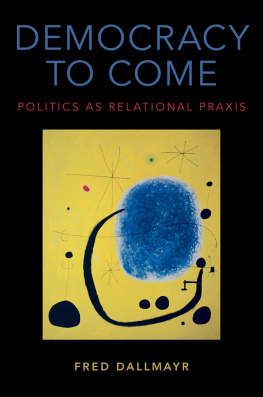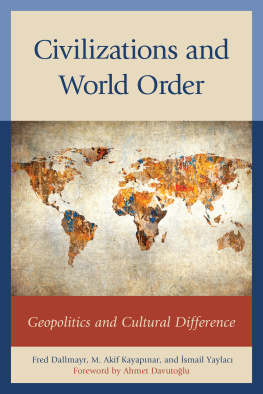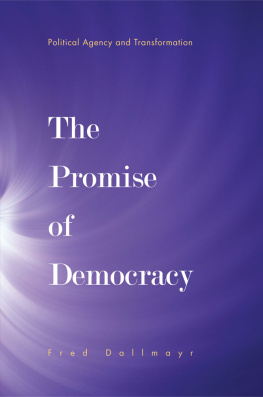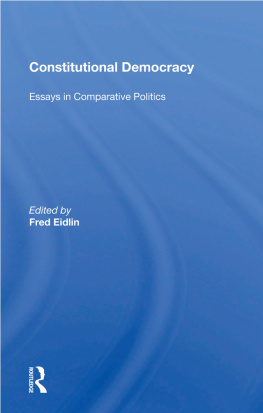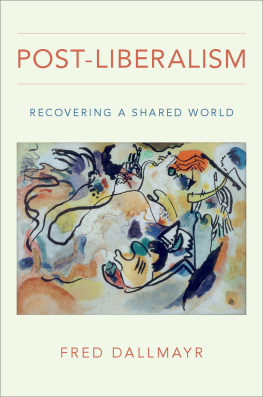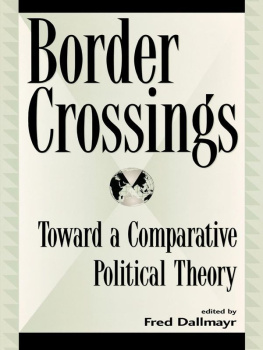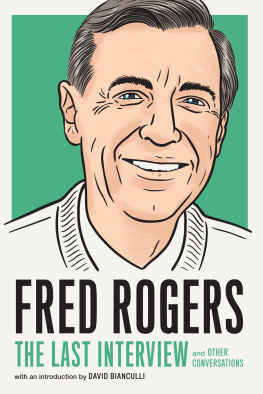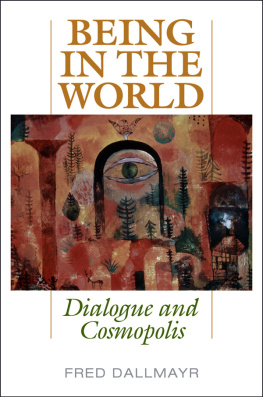Dallmayr Fred - Democracy to Come
Here you can read online Dallmayr Fred - Democracy to Come full text of the book (entire story) in english for free. Download pdf and epub, get meaning, cover and reviews about this ebook. year: 2017, publisher: Oxford University Press USA - OSO, genre: Politics. Description of the work, (preface) as well as reviews are available. Best literature library LitArk.com created for fans of good reading and offers a wide selection of genres:
Romance novel
Science fiction
Adventure
Detective
Science
History
Home and family
Prose
Art
Politics
Computer
Non-fiction
Religion
Business
Children
Humor
Choose a favorite category and find really read worthwhile books. Enjoy immersion in the world of imagination, feel the emotions of the characters or learn something new for yourself, make an fascinating discovery.
- Book:Democracy to Come
- Author:
- Publisher:Oxford University Press USA - OSO
- Genre:
- Year:2017
- Rating:3 / 5
- Favourites:Add to favourites
- Your mark:
- 60
- 1
- 2
- 3
- 4
- 5
Democracy to Come: summary, description and annotation
We offer to read an annotation, description, summary or preface (depends on what the author of the book "Democracy to Come" wrote himself). If you haven't found the necessary information about the book — write in the comments, we will try to find it.
Democracy to Come — read online for free the complete book (whole text) full work
Below is the text of the book, divided by pages. System saving the place of the last page read, allows you to conveniently read the book "Democracy to Come" online for free, without having to search again every time where you left off. Put a bookmark, and you can go to the page where you finished reading at any time.
Font size:
Interval:
Bookmark:


Oxford University Press is a department of the University of Oxford. It furthers the Universitys objective of excellence in research, scholarship, and education by publishing worldwide. Oxford is a registered trade mark of Oxford University Press in the UK and certain other countries.
Published in the United States of America by Oxford University Press
198 Madison Avenue, New York, NY 10016, United States of America.
Oxford University Press 2017
Chapter 5 is a revised version of Confucius for Our Time: Reflections on Politics, Law and Ethics, in Confucianism, Law, and Democracy inContemporary Korea, edited by Sungmoon Kim, published by Rowman & Littlefield, 2015.
All rights reserved. No part of this publication may be reproduced, stored in a retrieval system, or transmitted, in any form or by any means, without the prior permission in writing of Oxford University Press, or as expressly permitted by law, by license, or under terms agreed with the appropriate reproduction rights organization. Inquiries concerning reproduction outside the scope of the above should be sent to the Rights Department, Oxford University Press, at the address above.
You must not circulate this work in any other form and you must impose this same condition on any acquirer.
Library of Congress Cataloging-in-Publication Data
Names: Dallmayr, Fred (Fred Reinhard), 1928- author.
Title: Democracy to come : politics as relational praxis / Fred Dallmayr.
Description: New York, NY, United States of America : Oxford University Press, [2017] | Includes bibliographical references and index.
Identifiers: LCCN 2016047374| ISBN 9780190670979 (hardcover) | ISBN 9780190670993 (epub) | ISBN 9780190670986 (updf)
Subjects: LCSH: DemocracyPhilosophy.
Classification: LCC JC423 .D2774 2017 | DDC 321.8dc23
LC record available at https://lccn.loc.gov/2016047374
IN TYRANNOS:
Against bullieslocal, national, global
Democracy is the major catchword of our time. Some prominent recent authors have pinpointed as the central feature of our time that of a secular age. Although appreciating the important role played by secularism and secularization, however, I find that the pride of place must go to democracy and democratizationwhose meaning is ambivalent and deeply contested. In all corners of the world, from West to East, from North to South, ordinary people are trying to find their roles and express their voices in public democratic spaces or arenasarenas which often are merely nascent or embryonic.
One of the major factors holding back the spreading and actualization of democracy is the persistence of structures of hierarchy, elitism, and hegemony, structures which harken back to bygone, undemocratic eras. In opposition to these legacies, this book takes seriously the teaching of Montesquieu that democracy is sustained by a distinctive spiritthe spirit of love of equalitywhere equality means a qualitative, ethical relationship manifest in mutual respect, empathy, and solidarity on all levels of public life. To this extent, this book properly carries the motto In tyrannos: Against bullieslocal, national, global.
As in the case of other endeavors, I have benefitted in writing this book from the generous support, friendship, and also critical appraisal of numerous friends and colleagues in many corners of the world and in a multitude of civilizational contexts. For this I am genuinely grateful. My deepest thanks as always go to my wife, my children, and my grandchildren. May they be able to live their lives freely and peacefully, without interference and harassment by bullies who are the bane of democracy and the good life.
Fred Dallmayr
Notre Dame, July 2016
Looked at with hindsight, Tocquevilles statement was accurate, and in fact prophetic. Since the time of his famous book, the contagion of democracy has indeed spread from Europe and America to other parts of the world, and it still continues to function as an
Despite a rich welter of historical details, the successive stages of democratization depicted in Huntingtons study are remarkably uniform: the waves that reached global shores in recent decades were basically the same that first arose in America in the1800s. Differently put, the waves reflect a spatial or quantitative extension of democracys reach, but little or no qualitative change regarding its meaning. In fact, the only qualitative change marking the entire process is the progressive curtailment of qualitative criteria. In this
The empirical referent rendering the definition useful is the individual voter as foundational unit, and the analytical precision derives from the possibility of a purely quantitative calculation of votes without any regard for the quality of voting preferences. Thus, what surfaces behind the waves of democratizationas a kind of basso continuois a familiar figure of Western modernity: the Cartesian ego cogitans restyled as homo economicus, or rational utility maximizer. Differently put, the entire drama of democratization and modernization boils down to the entrenchment and triumphant globalization of egocentrism (and Western-centrism). Huntington is not hesitant to acknowledge the basic coincidence of the empirical definitionwhich he also calls a procedural or a minimal definitionbeing in line with the core of the American version of liberal (or libertarian) democracy. He writes that the correlation between the existence of democracy and the existence of individual liberty is extremely high, a nexus due to the fact that individual
The notion of a linear continuity of developmentacross temporal and spatial contextsis not unique to Huntington. In a way, there has always been a reluctance to acknowledge the impact of paradigmatic shifts between historical periods and cultural spacesincluding shifts between political regimes. The tendency has always been to interpret the unfamiliar in terms of the familiar, the new in terms of the tried and true. This tendency was even present among the ancients and their efforts to differentiate political regimes. Even Aristotleotherwise such an astute observer of political lifesimply placed the difference between regimes in the number of rulers. Given that the most familiar experience in antiquity was with monarchies or empires, ruled by one (or a few), the temptation was great to see the difference of democratic regimes in the numerical shift of rulers from one to the many. The notion that the shift might be accompanied by multiple other changessocial, psychological, ontological, and (even) theologicalwas not seriously considered. Thus, in Western modernity, when a change occurred from monarchical to republican or democratic regimes, the shift was basically theorized in terms of the changing locus of sovereignty: from the king to the people. Despite his close
As always in historical developments, there are exceptions to the general rule. With regard to paradigmatic shifts undergirding regime changes, it was primarily the Baron de Montesquieu who, at the onset of the Western Enlightenment, perceived a deep existential or ontological mutation in the transition from monarchy to democracy. Instead of counting the number of rulers, Montesquieu concentrated on the basic tuning or mode of life animating political regimessomething he called their espirt gnral or caractre commun. Whereas traditional monarchy relied on the hierarchical subordination of the many to the one (or few), the emerging republican or democratic regimes emphasize the symmetrical correlation among participants. Hence, for Montesquieu, the guiding spirit of traditional monarchies (and aristocracies) was honor or respect for distinctive merit, while the wellspring or animating soul of democracy is relational symmetry, or equality. This equality is not an abstract principle or Enlightenment maxim, but rather a concrete way of life or mode of conduct. When exhibited in practical conduct, the democratic spirit translates into love of equality, which is synonymous with love of democracy. Far from being reserved for an elite, the democratic spirit, Montesquieu notes, is a sensation that may be felt by the meanest as well as the highest person in the state. Moreover, by being called a love, the spirit does not reflect a purely quantitative measurement, but rather a qualitative relationship or existential relationality.
Font size:
Interval:
Bookmark:
Similar books «Democracy to Come»
Look at similar books to Democracy to Come. We have selected literature similar in name and meaning in the hope of providing readers with more options to find new, interesting, not yet read works.
Discussion, reviews of the book Democracy to Come and just readers' own opinions. Leave your comments, write what you think about the work, its meaning or the main characters. Specify what exactly you liked and what you didn't like, and why you think so.

